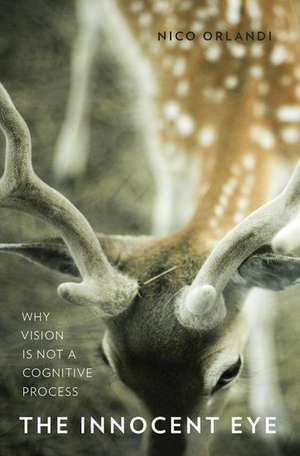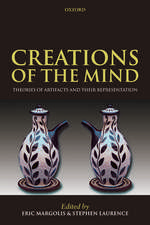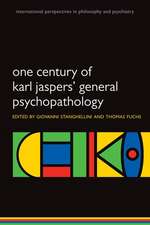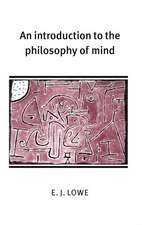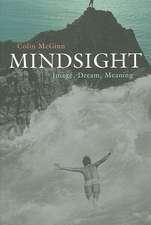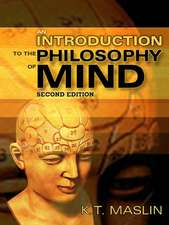The Innocent Eye: Why Vision Is Not a Cognitive Process: Philosophy of Mind
Autor Nico Orlandien Limba Engleză Hardback – 21 aug 2014
Din seria Philosophy of Mind
- 9%
 Preț: 505.93 lei
Preț: 505.93 lei -
 Preț: 140.63 lei
Preț: 140.63 lei - 19%
 Preț: 494.94 lei
Preț: 494.94 lei - 13%
 Preț: 422.10 lei
Preț: 422.10 lei -
 Preț: 294.37 lei
Preț: 294.37 lei - 31%
 Preț: 891.10 lei
Preț: 891.10 lei - 27%
 Preț: 476.33 lei
Preț: 476.33 lei -
 Preț: 315.38 lei
Preț: 315.38 lei - 22%
 Preț: 486.70 lei
Preț: 486.70 lei - 27%
 Preț: 420.09 lei
Preț: 420.09 lei - 14%
 Preț: 116.67 lei
Preț: 116.67 lei - 5%
 Preț: 279.89 lei
Preț: 279.89 lei - 19%
 Preț: 307.49 lei
Preț: 307.49 lei - 25%
 Preț: 530.32 lei
Preț: 530.32 lei - 28%
 Preț: 400.55 lei
Preț: 400.55 lei - 28%
 Preț: 399.92 lei
Preț: 399.92 lei
Preț: 382.13 lei
Preț vechi: 527.22 lei
-28% Nou
Puncte Express: 573
Preț estimativ în valută:
73.13€ • 79.41$ • 61.43£
73.13€ • 79.41$ • 61.43£
Carte tipărită la comandă
Livrare economică 11-17 aprilie
Preluare comenzi: 021 569.72.76
Specificații
ISBN-13: 9780199375035
ISBN-10: 0199375038
Pagini: 262
Dimensiuni: 236 x 155 x 25 mm
Greutate: 0.45 kg
Editura: Oxford University Press
Colecția OUP USA
Seria Philosophy of Mind
Locul publicării:New York, United States
ISBN-10: 0199375038
Pagini: 262
Dimensiuni: 236 x 155 x 25 mm
Greutate: 0.45 kg
Editura: Oxford University Press
Colecția OUP USA
Seria Philosophy of Mind
Locul publicării:New York, United States
Recenzii
Perhaps the greatest strength of the The Innocent Eye is that it functions as a sobering case study with which to focus recent debates over the role of representation in scientifically informed explanations. Regardless of one's philosophical allegiance, the book usefully draws out some of the stakes by centering in on the concrete issue of visual processing. In doing so, it provides a readable yet comprehensive contribution to one of the most important and hotly contested areas in current philosophy of cognitive science.
I am sympathetic to Orlandi's viewpoint. The Innocent Eye draws the attention of philosophers to research that they have mainly neglected, and challenges the computationalist consensus that has been mainly taken for granted since philosophers learned about Chomsky, Pylyshyn, and Marr.
In The Innocent Eye: Why vision is not a cognitive process, Nico Orlandi considers visual perception at a more basic level ... According to Orlandi, we should take seriously an 'embedded' view of vision. According to this view, the operations of the visual system do not consist in the following of rules, inferential transitions, or symbol manipulations. Rather, they reflect how, by being embedded in an environment, visual processes are hard-wired, naturally biased or constrained to deliver certain outputs in certain conditions. Nico Orlandi's book is an original, detailed, and robustly argued defence of these claims.
Orlandi argues convincingly that philosophical theorizing about vision should highlight how the external environment molds visual activity. I think she would have done better to showcase the embedding environment in conjunction with the constructivist paradigm, not as the basis for a rival paradigm. Nevertheless, I found her discussion enjoyable and thought-provoking at every turn. All philosophers interested in perception should read this book
I am sympathetic to Orlandi's viewpoint. The Innocent Eye draws the attention of philosophers to research that they have mainly neglected, and challenges the computationalist consensus that has been mainly taken for granted since philosophers learned about Chomsky, Pylyshyn, and Marr.
In The Innocent Eye: Why vision is not a cognitive process, Nico Orlandi considers visual perception at a more basic level ... According to Orlandi, we should take seriously an 'embedded' view of vision. According to this view, the operations of the visual system do not consist in the following of rules, inferential transitions, or symbol manipulations. Rather, they reflect how, by being embedded in an environment, visual processes are hard-wired, naturally biased or constrained to deliver certain outputs in certain conditions. Nico Orlandi's book is an original, detailed, and robustly argued defence of these claims.
Orlandi argues convincingly that philosophical theorizing about vision should highlight how the external environment molds visual activity. I think she would have done better to showcase the embedding environment in conjunction with the constructivist paradigm, not as the basis for a rival paradigm. Nevertheless, I found her discussion enjoyable and thought-provoking at every turn. All philosophers interested in perception should read this book
Notă biografică
Nico Orlandi is Assistant Professor in the Philosophy department at Rice University.
